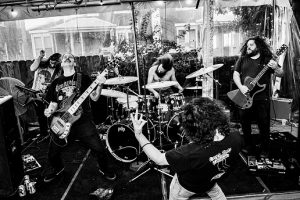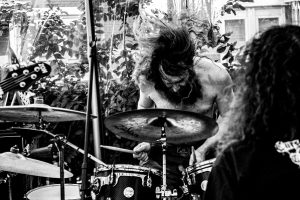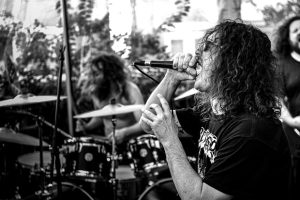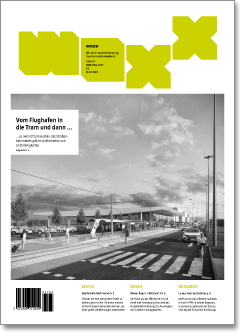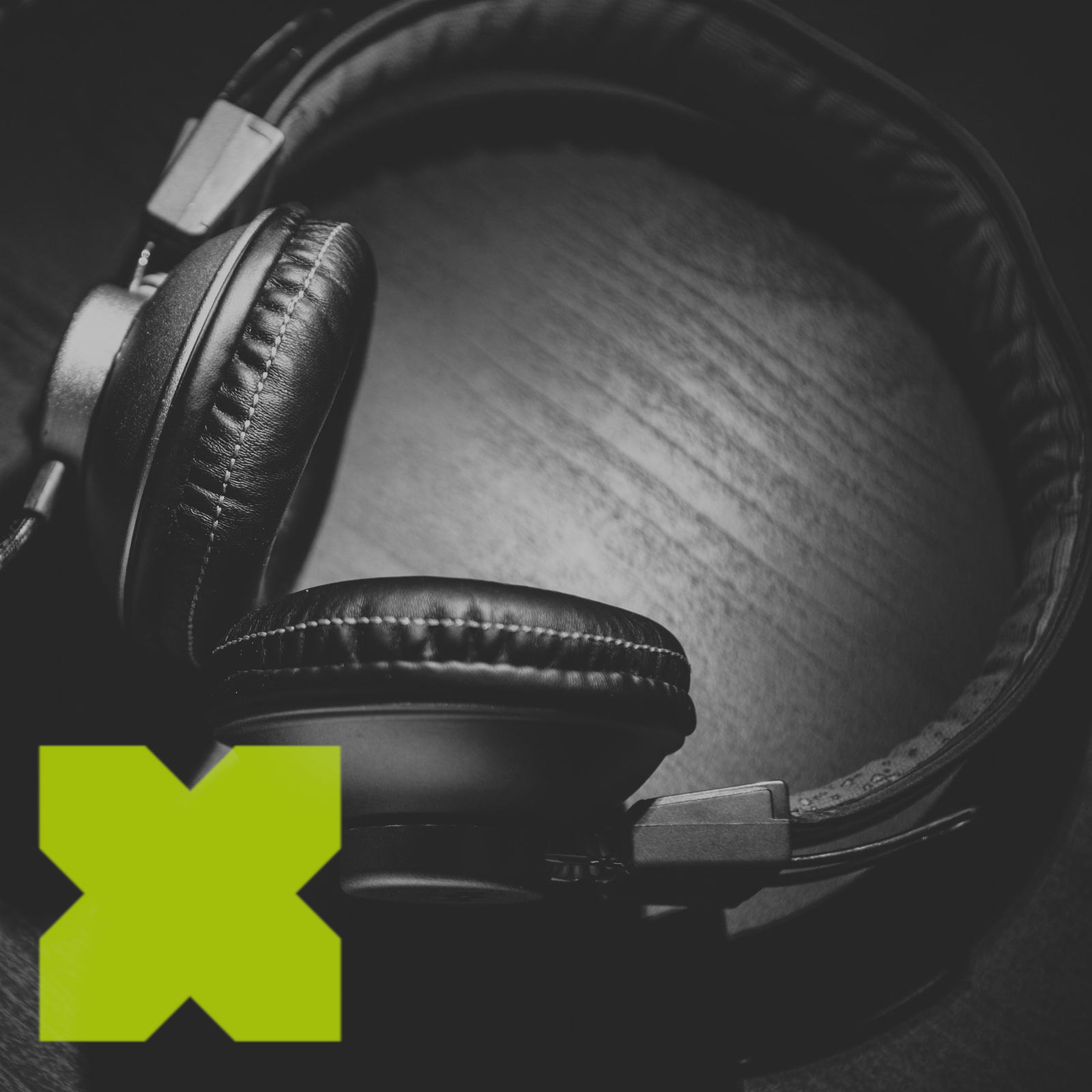It has often been said that Inter Arma, other than being a metal band, cannot be pigeonholed musically. But one thing is for sure: they’re one of the best live acts around right now, delivering nothing less than sonic transcendence. A conversation with Inter Arma’s T.J. Childers about how to create insane levels of intensity on stage, about their upcoming album “New Heaven” – and about starting a career as a drummer at the age of three.
woxx: I just finished reading Cormac McCarthy’s “The Passenger” this morning. To me, the novel corresponds with how it feels like to delve into the musical universe you create. Both evoke a bleak atmosphere, exposing different layers of human suffering and ways of trying to cope with it. Despite all this, both the novel and the music convey a certain feeling of joy and consolation, as the suffering associated with the human condition is at least articulated.
T.J. Childers: I haven’t read that one yet, but I definitely can see what you are talking about. I’m a big Cormac McCarthy fan, as is Mike (Mike Paparo, singer of Inter Arma; ed.). Mike writes all the lyrics. Cormac McCarthy is like if Hank Williams, or another really great country singer, wrote a novel, because the language he uses is kind of minimalist, but he really paints a vivid picture, while he’s using few words. Even his style of creating dialogues, especially if you’re talking about “No Country for Old Men”, where it is more of a western-based type of thing… somebody said it’s how everyone talks, and it’s how no one talks. It’s almost like an antiquated sort of language, which I feel like foundationally, from a musical standpoint, Inter Arma is too. Our music is kind of antiquated because our records don’t really sound like modern metal records. It’s more of an old-school rock’n’roll type of thing, and to me, those are always going to be the best sounding records anyway. So it’s kind of similar in that way. And also, like you said, both are painting kind of a bleak picture and talk about human suffering and loss and all those sorts of themes. Definitely some parallels there. I was actually talking with Mike about this a week or two ago. I didn’t even realize that Cormac McCarthy had died. That’s how out of the loop I am. And then I didn’t find out that he had written a new book until probably six months after it had been out. And I think he died shortly after. I don’t think Mike has read the new one. But that said, I know Mike would be flattered if you said that you drew comparisons to Cormac McCarthy and Mike’s lyrics. And I know that he’s one of his big inspirations. Not exclusively, but definitely.
I am not surprised to be honest, having read Inter Arma’s lyrics. What else is Mike drawing his inspiration from?
The lyrics are mostly not political. They’re definitely more personal. Mike would be the better person to ask that question to, but I can give you a general idea. They are about his own struggles with depression and loss, relationships ending, whether for good reasons or bad reasons or whatever, just kind of the human condition in general, dealing with sadness and dealing with how fucked up the world is, trying to just get through the day and still be a functioning human being and trying to maintain some level of happiness.
Beginning their musical journey in 2006, the Richmond, Virginia metal band Inter Arma has come a long way, arriving at their fifth full-length album, “New Heaven”, which will be released on April 26th of this year. Convincingly defying every musical categorization critics try to apply, they continue to do what defines all great art: express themselves and their sonic visions because they must. In Europe, they will perform at the Roadburn Festival in Tilburg, Netherlands, April 18-21, alongside bands such as Chelsea Wolfe, Khanate, Dool, Blood Incantation, and The Jesus and Mary Chain. Inter Arma will return to Europe for an extensive tour later this year.
Inter Arma is:
T.J. Childers – drums, percussion, guitars, lap steel, piano, noise.
Trey Dalton – guitar, synthesizers, Mellotron, vocals.
Joel Moore – bass, synthesizers, tape loops, samples, and noise.
Mike Paparo – vocals.
Steven Russell – guitars.
It’s been five years since you put out your last album, “Sulphur English”, in 2019. How do you create new music?
I’m the primary songwriter in the band musically. And I didn’t sit down and think, okay, I’m going to write a song that sounds like it could be the background for a Cormac McCarthy book or something like that. But I think that in any art form, those sorts of similarities and parallels always have a common thread, at least in the art that I gravitate towards. Whether it’s music or visual art or literature, whatever it is, there’s always a certain darkness to it.
How was the whole Covid period for you as a band? Did it affect you a lot?
It took its toll on us, for sure. We were supposed to play Roadburn Festival in 2020. And we had a full US tour coming up. We had a smaller European tour planned as well. All of those were in the books and ready to go. It was 74, 75 dates that were cancelled. But we also had another US tour, as well as another bigger European tour coming up, and a bunch of fests. Those weren’t official yet. All that got thrown away. And then we didn’t practice from March until August 2020, which was the longest we’d ever gone without practicing since the start of the band. That was weird. And then we lost our bass player, got another bass player and then wound up having to part ways with him as well. There was actually a pretty long lapse between the second guy and our current bass player, Joel (Joel Moore; ed.), so for about six months we didn’t have a bass player. So, yeah (giggles), it was an interesting time to say the least.
Some people seem quite obsessed with putting you in a certain box when it comes to defining Inter Arma’s musical style. I wonder if this is partly because the music you play makes people uncomfortable, as it is so disquieting in a way. So maybe people want to reduce that unsettling effect by putting a label on what is happening, to make it more emotionally predictable.
I understand the need for putting it in a box, so to speak, from a marketing level. I get it from that standpoint. It doesn’t make me mad. But it’s like saying the Beatles are a pop rock band. It sells it short so much, it’s such a disservice to it. It’s like saying Judas Priest is just a heavy metal band. They are that, but they are tons of other things too. They have acoustic parts, they have harmony vocals, there’s classical infusion in there. I don’t know. Again, I understand it and I get it from a marketing standpoint. But saying that Inter Arma is a doom band or a sludge band, I feel like it’s selling us short.
I think that’s really weird, because when something really special happens on a musical level, and I think that you achieve this with your albums and certainly with your live shows, then it’s really not important anymore how you label it. You should be happy that you can have that kind of experience. I’ve seen you play live in Antwerp in 2019 and I personally can only think of one experience of a band that was able to pull off the same level of intensity on stage, Neurosis during their “Souls at Zero” tour in 1991. How do you create that intensity as a band when you play live?
Well, I guess the simple answer would be: Who wants to go see a band that just stands there on stage and plays the song? Because it’s still a live performance, focusing more on the word performance. So I feel like you do have to perform to a certain level. But also, I think if you just feel intensely about the music that you’re playing anyway – and Neurosis is the example that is kind of the go to for anybody who’s having this sort of conversation –, where you’re playing your instrument in a devoted manner, you’re trying to service the songs and the music justly. Honestly, it’s a performance and we are performing, but when we’re playing, I don’t feel like I’m putting anything on necessarily. It’s just that I want to put as much energy and emotion as possible into what I’m playing live. Pretty much as much as I possibly can, sort of completely exhausting myself. So, yeah, it really comes naturally, honestly, it’s not something I sit down to and consciously think about so much. It’s just sit down – in my case, I’m sitting down –, strap your guitar on and just play the hell out of it.
Do you lose yourself in the music to a certain extent during the show?
I’m not really thinking too much when I’m on stage. I mean, obviously we have rehearsed, so there’s a certain level of preparation that goes through all of it. But, yeah, especially on a good night – when everything’s really clicking, the crowd’s really good, and the sound is good, that tends to help out a lot, too – so, yeah, on the good nights, it’s like I’m barely there. I’m not thinking about anything. I really am just going.
When you write new songs, what are your influences? Can you describe the process a bit?
There’s a bunch of different ways. I wrote something at 5:30 in the morning last week, and it started out when I was literally driving on my way to work, and I had this pattern that I’ve kind of been messing with. It’s in 9/8 (time signature of the beat T.J. is talking about; ed.). And I just was tapping on my leg. And I actually thought of a riff and a vocal melody and just hummed all three parts into my phone. And then I went to work, and when I got home later that day, I actually sang the vocal melody, and then just went from there and just played the guitar part and made a demo on my computer. That’s one example. A lot of the riffs I’ve written for Inter Arma over the years, I’ll go out on Friday or Saturday night, hang out with the fellas and be drinking beer, wake up Saturday morning, be kind of hungover, and just sit down in my underwear and play guitar while I’m hungover. And I’m not really thinking about it too much because I’m over. And then next thing you know, like, oh, this actually sounds cool, while I’m watching television or something. Something that pops up. There’s different ways for how ideas come about.
So the songwriting in Inter Arma is not really a collective process in a sense that you’re jamming a lot?
We jam a lot, too. I mean, everyone lives in town, so we’re not writing everything via the internet. And I don’t write everything. Sometimes Trey (Trey Dalton, guitar; ed.) will have an idea, sometimes Steven (Steven Russell, guitar; ed.) will have an idea. And if they have a riff or maybe a couple of riffs, we’ll bring it in, jam on it for a while, see where it goes, where we feel like the vibe of the song is taking us, and then sort of work off of that. And sometimes from there, if we’re working on something that I’ve written, we’ll get a loose structure and I’ll think, okay, it needs to go into some sort of, like, a bridge or whatever, and I’ll come back and actually try to come up with something specifically for something that’s already written. Sometimes the idea will present itself right there in the band.
How does your singer Mike come in?
He’s obviously there at band practice as well, and he’s pretty much there during the whole process of the songwriting. So he’s listening to the songs, and he gets ideas for lyrics based on how the song sounds. He’s just in there listening to us play the song. He’s told me before that a song makes him have this certain thought or a certain feeling, and he’ll write lyrics based off of that. Like, as far as if he’s going to be doing something that’s more melodic or if he’s going to be doing something that has more harsh vocals. Whether it’s like black metal or death metal style vocals that’s also, he says, influenced by… if the riff is more melodic or if it’s the heavier, faster, black or death metal.
In the announcement that you will play Roadburn Festival in Tilburg in April you are quoted with the statement that your new album is the most colorful of your career. How would you describe your musical journey, arriving from where you started with your first album “Sundown” at “New Heaven” now?
Well, certainly “New Heaven” is not nearly as aggressive as “Sulphur English”. The last record was very foot on the throat, beating you up for however long the record was. Whereas this one is, I feel like there’s a bit more light and shade. There’s definitely a lot more melody in it. And to be completely honest with you, that wasn’t a conscious choice. The only conscious choice that we made as far as songwriting is concerned on this last one was to try and trim the fat, so to speak, wherever we could, where the songs were a little bit more precise. Not necessarily trying to write shorter songs, but trying to have things not quite as meandering as they were before. And even though there’s still plenty of space, it’s not like we’re writing three-minute-long pop songs. I don’t think we could do that if we had to. But, yeah, definitely a bit more concise this time around.
When I listened to the new album, I had a similar experience as when I listened to “Sulphur English”. Both albums begin with songs that emanate an extremely disquieting atmosphere, forcing a reaction almost on a physical level: You’re forced to keep listening to it, and at the same time you want it to stop – it’s like the music itself evokes aspects of your own personality you don’t really want to be confronted with. And those songs are followed by tracks that are rather immersive, with a driving rhythm that allows for some kind of soothing, in a certain sense. To what extent does the album as a whole follow an aesthetic concept?
I just turned 41, so I feel like I’m older than most people or at least older than a lot of people who like our band. Everything is so singles-driven these days, and even the songs are getting shorter. And all the records that I love – for example if I’m going to put on Metallica’s “Ride the Lightning” – I’m going to listen to the album all the way through. I’m not just going to listen to “For Whom the Bell Tolls”. Most music I listen to, most records I listen to, I listen to the whole thing. So I’ve always thought of Inter Arma as an album band. That’s how I listen to albums. I don’t listen to just one song. Some of that is definitely by design. And even something that I think is very important to me and important to the band as well, is the song sequence of a record. Does it have hills and valleys? And not to keep referencing Metallica, but they always kind of had that sort of thing, especially on “Ride the Lightning”, “Master of Puppets” or “…And Justice for All”: Usually the fourth song was the sort of balladic kind of song. So the record takes off pretty fast and it gets even faster and then sort of drops down, lets you breathe for a minute and then sort of picks back up. Usually the last song on this record is the acoustic song, so it kind of hits it real hard and then drops back off at the very end again. I always like records like that, whether Metallica, Neurosis or ZZ Top or whatever.
So what does “New Heaven” stand for? Is it a metaphor for your own challenge and journey, or how do you relate to the title?
Well, to be completely honest with you, the title kind of started out as a joke, and then it kind of took on its own meaning. And we do feel like this is a new chapter. I mean, we feel like every record is a new chapter, but this one in particular does have a little bit more… It’s not like it’s a completely different band, because it’s not. But this record seems to be a little bit more different, even by our standards, where all of our records are a little bit different from one another. This one is even more different. It’s like it’s more Inter Arma, but then it’s also sort of less Inter Arma, if that makes any sense at all. So it does feel like it’s a little bit of a new thing that’s going on. The joke was, because we toured with Deafheaven, and we were in the van, joking: Deafheaven will not like us anymore. They’re not going to take us on tour anymore. It’s the “New Heaven”. Kind of snowballed from there. When Mike wrote the lyrics and the song, he liked the title, and then it kind of took on this whole other thing.
There’s been a lot of talk about the use of artificial intelligence lately, in order to create album covers and other elements of the album design, like for example “Deicide” did. When I thought about discussing this with you, it made me think of a small note you wrote for the magazine “Modern Drummer” in 2019, where you argue against the use of modern metal and hard rock drum production like quantizing, and I quote: “This lack of human emotion is exactly why rock and roll and heavy metal are nothing more than ghosts on mainstream television and radio in 2019, and from the sounds of things will remain that way for the foreseeable future.” Would you hold on to this opinion today and to what extent has this judgement become even more true with regards to AI?
I’m not a fan, period. And I guess AI is still so new that maybe five to ten years down the road, people can write AI songs and they’ll be much more convincing. But right now, when I hear samples of, like, AI wrote a Nirvana song – and, I get it, I see where it’s headed and maybe it’ll get better –, I don’t ever see computers and machines being able to replace human emotion. I don’t ever see that happening. And even the “Modern Drummer” quote, I’m talking about quantizing music where everything’s put on a grid and everything’s made to sound perfect and it’s tuned perfectly. That is not interesting sounding to me. When I hear a band, especially in metal and technical death metal and all that shit, when everything sounds perfect, it’s not exciting to me. It doesn’t sound like human beings anymore. It doesn’t sound cool to me. Even when a guitar player is so good, like Yngwie Malmsteen, he’s fucking unbelievable… but after a couple of minutes, he’s so good and so fast, so clean, I am like: This is boring now. I guess because I come from a punk rock background as well. I want to hear a slop. I mean it’s cool when somebody is really technically proficient at their instrument. Nile is a great example. George Kollias is probably the fastest drummer on earth. But after a couple of songs, goddamn, this guy is so good that it’s boring me. He’s so fast that it sounds goofy after a while because it’s so fast. I’d rather hear somebody who’s playing slower and falls off pace a little bit. To me, that’s much more exciting than somebody who can play 250 beats per minute for 20 minutes straight perfectly. And that’s even not AI but you’re still taking a machine and making it sound perfect. It’s boring to me. To me, the most exciting record, I’ll give you an example, is, with death metal, Hate Eternal’s album “King of all Kings”. That record, to me, it sounds like madness because they are so fast, but it’s really them playing, it’s not quantized and it’s not perfect. So it just sounds like this freight train that’s going a thousand miles per hour. And it’s almost falling off the tracks, it’s almost going to crash, but then it’s holding on. And to me, that’s fucking cool. Whereas if everything is going a thousand miles per hour, and it’s totally perfect, it’s just not as exciting to me.
Makes me think of the first time I heard Kreator’s “Pleasure to Kill” back in the eighties. When I heard that sick drum sound, I thought, “my God – this guy sounds like he’s playing on a set of bones”.
Even old Motörhead records and stuff like that, where they’re just going, you can hear little imperfections here and there. It’s the same thing on our records. I’ve said that in the past: If you listen to my drum track with headphones on, if you listen to the record and really focus on me playing, I’m making mistakes. I’m making mistakes all over the place. But if the overall take is good, then fuck it, let it fly.
There’s this video on YouTube of you playing when you were seven years old with your uncle and your dad. It’s so impressive how you play even then. It all seems so natural. When did you start playing drums and how did you get the feeling for the sound you wanted to achieve?
Well, I started playing when I was three, and I actually wanted to play guitar first, but my dad needed a drummer for his cover band, so he threw me behind the drum set. But I’m glad that he did. And for the first ten years that I played drums, I only played covers. So I was learning AC/DC, Led Zeppelin, ZZ Top, Lynyrd Skynyrd, stuff like that. That really was the greatest musical education I think I could have had, because it taught me not only how to play drums, but how to play for the song, which is something I talk about quite a bit. Phil Rudd (drummer of AC/DC; ed.) is a perfect example. He knew exactly what to play. Don’t overplay. Throw in a little spice for a fill or an accent or whatever here and there and let the guitars shine. I definitely come up with some wacky drum patterns sometimes. And sometimes that’s how a song is written. “The Children the Bombs Overlooked” on “New Heaven”, that whole song was written around the drum patterns. But for the most part, playing for the song is what’s important to me, developing a solid foundation for the riff. Because even though I’m a drummer, I’m listening to the riff. When I put on AC/DC, I’m listening to… (imitates the guitar riff at the beginning of “Back in Black”; ed.), I’m not listening to Phil Rudd (claps the corresponding drum sequence on his thigh; ed.). Even though that’s cool, but I’m there for the riff.
I find your particular drum sound somewhat muted and dry. Why do you choose this kind of drum sound on your albums? If you can relate at all to what I’m asking, I’m not a drummer, so I’m sorry if my vocabulary doesn’t really fit what’s going on musically.
I understand what you’re saying. I like a nice room drum sound. I don’t really like it when it’s super in your face. And I guess that’s again because all the records I listen to are all old stuff where the drums aren’t super high in the mix anyway. And honestly, that’s what we sound like live anyway, because the guitars are so loud. The guitars are generally the main focus of attention musically. So that’s part of the reason why John Bonham is my favourite drummer (Led Zeppelin’s drummer who died in 1980; ed.). And it’s probably my favourite drum sound of all time on any record. I always try to have a John Bonham-y sort of sound where it’s not super high in the mix.
Do you have any plans to play in Europe besides Roadburn festival this year?
Yeah, we’re going to be doing a full European tour in September. I think we’ll be there for, like, three weeks to a month or something like that.
What are your expectations with regards to Roadburn? You’ve played there already, so you already have some experience.
Roadburn is the best metal festival in the world. The way it’s curated, the way it’s run. Walter and Becky (Walter Hoeijmakers, artistic director, and Becky Laverty, responsible for booking at Roadburn Festival; ed.) are the nicest people, you couldn’t ask for better people to have to work with. Whatever needs to be done, they’ll do it, and they’re always gracious, so I’m expecting it to be a fucking party.

